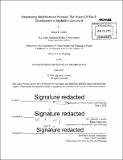| dc.contributor.advisor | Gabriella Carolini. | en_US |
| dc.contributor.author | Coffey, Alison E. (Alison Elizabeth) | en_US |
| dc.contributor.other | Massachusetts Institute of Technology. Department of Urban Studies and Planning. | en_US |
| dc.coverage.spatial | s-ck--- | en_US |
| dc.date.accessioned | 2015-09-29T19:01:37Z | |
| dc.date.available | 2015-09-29T19:01:37Z | |
| dc.date.copyright | 2015 | en_US |
| dc.date.issued | 2015 | en_US |
| dc.identifier.uri | http://hdl.handle.net/1721.1/99073 | |
| dc.description | Thesis: M.C.P., Massachusetts Institute of Technology, Department of Urban Studies and Planning, 2015. | en_US |
| dc.description | Cataloged from PDF version of thesis. | en_US |
| dc.description | Includes bibliographical references (pages 88-96). | en_US |
| dc.description.abstract | In a time of increasing concern over the impacts of climate change, environmental degradation, urban insecurity, and rapid urbanization, risk management has come to the forefront of planning agendas in cities across the world. No longer considered solely in environmental terms, key drivers of risk include a range of socio-economic and governance factors, and as such, risk management interventions have become tightly entwined with urban development politics. With many risks distributed unequally and affecting a city's most marginalized individuals and communities most significantly, understanding how the intersection of risk management and urban development manifests in planning and policy interventions at the neighborhood level proves increasingly important for equitable city planning pursuits. Using the case study of a Comuna 8, a semi-informal district in Medellín, this thesis explores how community-based groups situated in municipally-defined areas of high environmental risk negotiate their development priorities with city government and development entities. By examining how risk is invoked, re-interpreted or contested by different stakeholders pursing planning at different scales in Medellín, it demonstrates how the political nature of risk discourse and designations allows different stakeholders to justify, challenge, or carry through different development visions for a specific territory. For planners and communities concerned with equitable outcomes in cities facing complex environmental and social risks, this thesis suggests both the need for analytic frameworks that address risk in context of disputed development and improved decision-making structures that recognize the agency of grassroots actors in local development and risk management. | en_US |
| dc.description.statementofresponsibility | by Alison E. Coffey. | en_US |
| dc.format.extent | 96 pages | en_US |
| dc.language.iso | eng | en_US |
| dc.publisher | Massachusetts Institute of Technology | en_US |
| dc.rights | M.I.T. theses are protected by copyright. They may be viewed from this source for any purpose, but reproduction or distribution in any format is prohibited without written permission. See provided URL for inquiries about permission. | en_US |
| dc.rights.uri | http://dspace.mit.edu/handle/1721.1/7582 | en_US |
| dc.subject | Urban Studies and Planning. | en_US |
| dc.title | Negotiating neighborhood priorities : the politics of risk & development in Medellin's Comuna 8 | en_US |
| dc.title.alternative | Politics of risk & development in Medellin's Comuna 8 | en_US |
| dc.type | Thesis | en_US |
| dc.description.degree | M.C.P. | en_US |
| dc.contributor.department | Massachusetts Institute of Technology. Department of Urban Studies and Planning | |
| dc.identifier.oclc | 921883118 | en_US |
